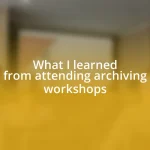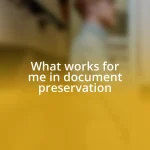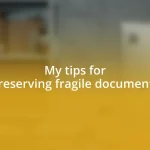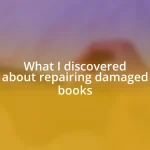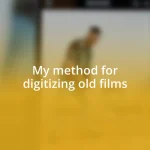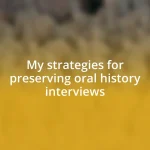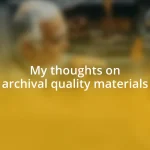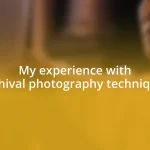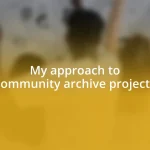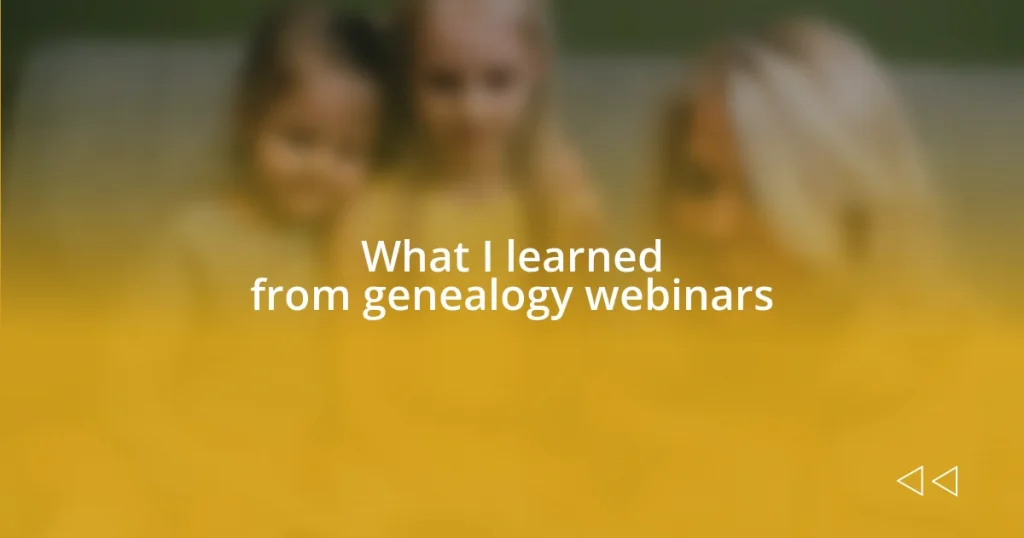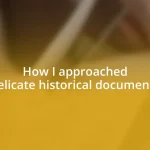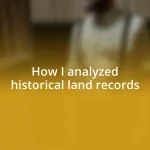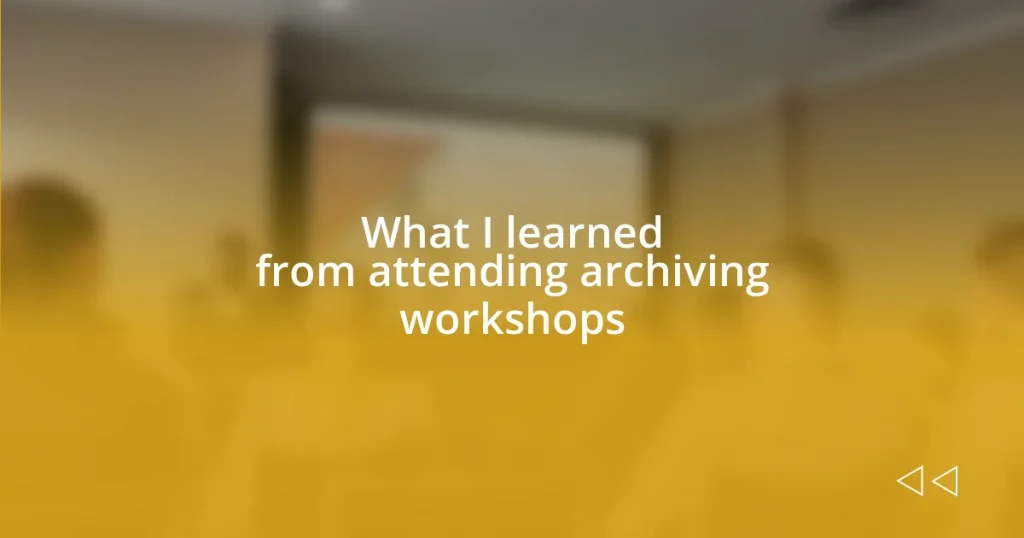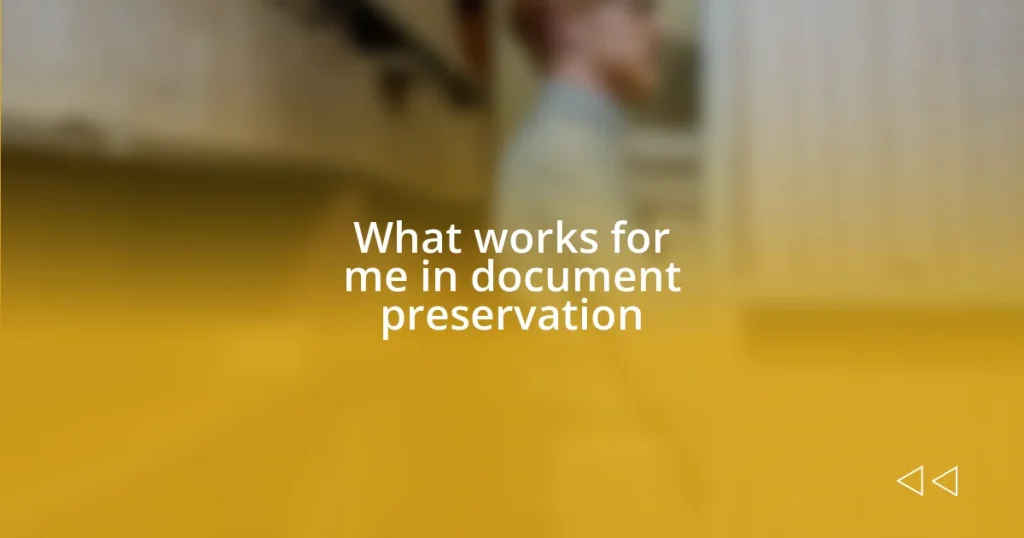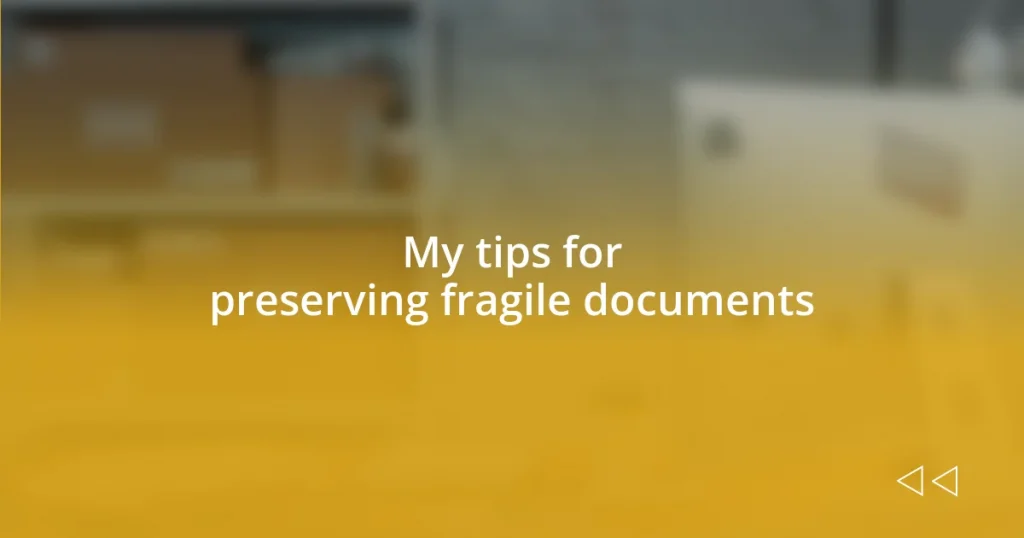Key takeaways:
- Genealogy webinars provide accessibility, a wealth of information in a focused timeframe, and interactive opportunities for personalized learning.
- Engaging with webinar leaders and networking with participants enhances learning, fosters connections, and opens doors to resources and collaboration.
- Continuing education through local clubs, reading, and structured courses expands knowledge and enriches research methodologies beyond webinars.
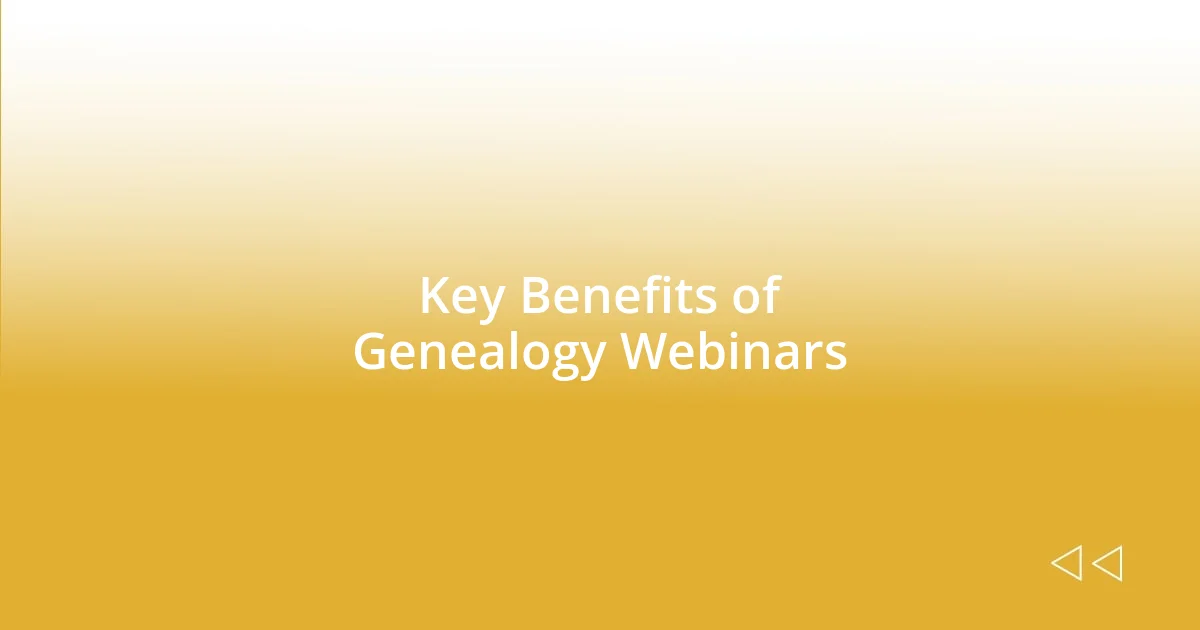
Key Benefits of Genealogy Webinars
One of the key benefits of genealogy webinars is the accessibility they offer. I remember joining my first webinar while lounging in my living room; I didn’t have to travel anywhere, yet I was learning from experts in the field. Isn’t it amazing how technology can connect us to knowledge without the hassle of logistics?
Another advantage is the wealth of information presented in a focused time frame. After attending a session on census records, I felt a rush of excitement as I jotted down strategies I’d never considered. Have you ever felt that thrill of discovering a new resource that could unlock your family’s history? That’s what these webinars can do for you.
The interactive nature of webinars is also invaluable. During a live session, I asked a question about a particularly tricky line in my family tree, and the expert provided tailored advice. How often do we crave that personal touch in learning? It truly makes the experience memorable and allows for deeper engagement with the material.
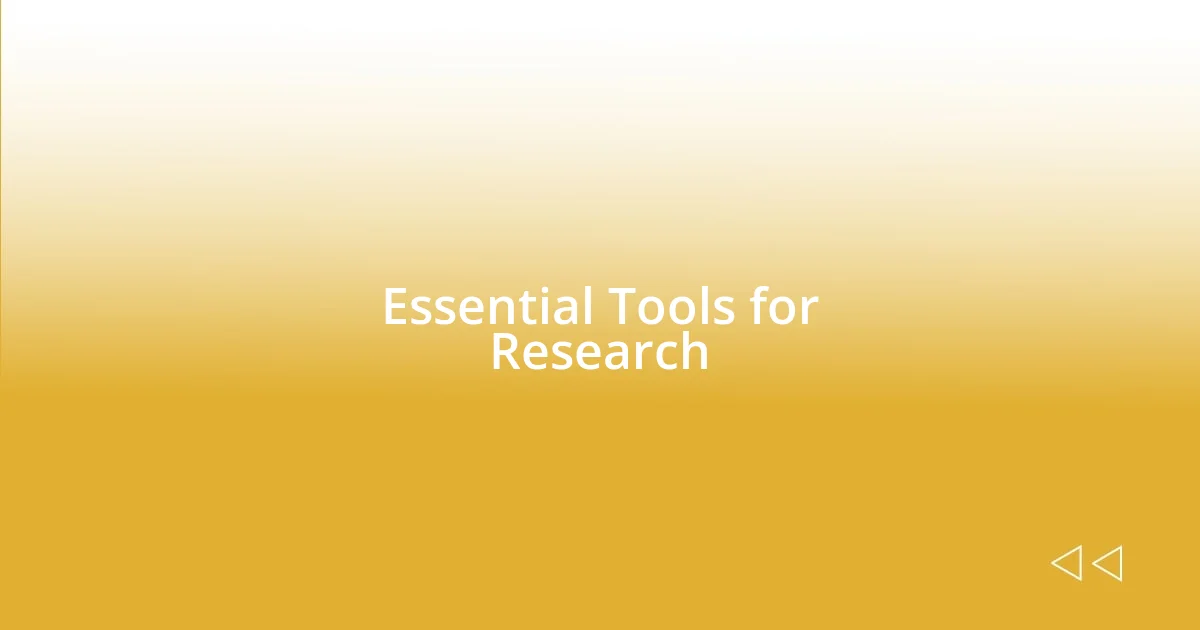
Essential Tools for Research
When conducting genealogy research, having the right tools is essential. I recall my excitement when I discovered online databases. They became my go-to resources for finding birth, marriage, and death records. The thrill of uncovering a long-lost ancestor through just a few clicks still amazes me.
I also found that genealogy software can be a game-changer. For instance, when I started using family tree programs, the visual aspect helped me connect the dots between various generations. I hadn’t realized how much easier it would be to track relationships and document my findings all in one place. Have you tried one of these programs yet?
Lastly, don’t underestimate the power of social media groups. I joined a Facebook group dedicated to genealogy enthusiasts, and the support I’ve received has been immense. I remember posting a query about my great-grandfather and receiving responses from multiple people with similar interests in just a few hours. It really reinforced the idea that the genealogy community is vast and always ready to help.
| Tool | Description |
|---|---|
| Online Databases | Resources for accessing vital records digitally. |
| Genealogy Software | Programs to visually organize and document family trees. |
| Social Media Groups | Communities for sharing and sourcing information on genealogy. |
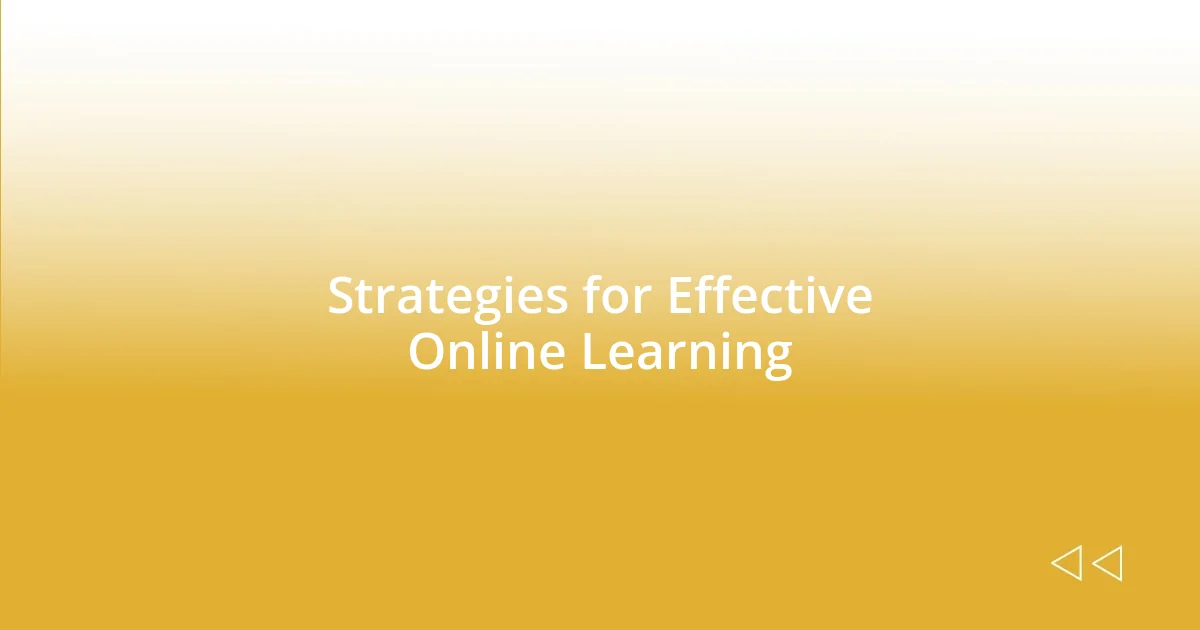
Strategies for Effective Online Learning
When it comes to effective online learning, I’ve found that setting a clear agenda beforehand makes a significant difference. Before diving into a webinar, I jot down specific questions or topics I want to explore. This not only keeps me focused but also allows me to reflect on the information presented in a meaningful way. Picture attending a webinar with a notepad in hand, capturing vital points while engaging with the content. It transforms learning from passive watching to active participation.
- Create a distraction-free environment: Silence your phone and close unnecessary tabs to maintain focus.
- Engage in discussions: Use chat features to interact with fellow attendees and deepen your understanding.
- Take structured notes: Summarize key ideas and highlight questions for follow-up exploration.
Additionally, I’ve discovered the value of revisiting recorded sessions. There was a webinar on DNA testing that I found particularly enlightening. After initially watching it live, I chose to re-watch it several days later. I was amazed at how much more I absorbed the second time. It was as if new layers of knowledge unfolded before me, connecting dots I hadn’t seen before. This repetition helped reinforce my understanding and allows me to apply what I learned confidently.
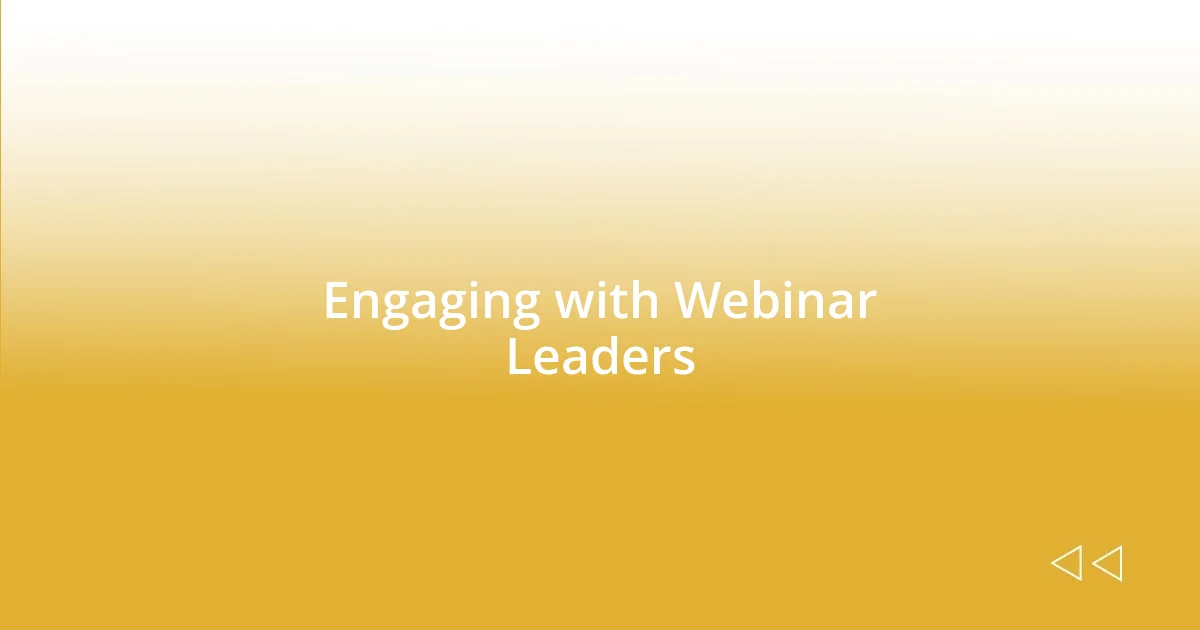
Engaging with Webinar Leaders
Engaging with webinar leaders can truly elevate the learning experience. I’ve had moments where I hesitated to ask questions, thinking they might seem trivial. But when I finally took the plunge and posed a question during a live session, I was met with enthusiastic responses. It’s amazing how approachable these experts can be, transforming a formal presentation into a two-way dialogue that enriches understanding.
One of the most impactful experiences for me was during a webinar hosted by a well-known genealogist. I remember asking her a specific question about military records and was pleasantly surprised at how she took the time to not only answer me but also share additional resources I could explore. Her passion for the subject was palpable, and it sparked an excitement in me to dive deeper into my own research. I realized then that engagement isn’t just about asking questions; it’s about building connections that inspire you to learn more.
Another tip I’d suggest is taking advantage of the chat features. I often find myself sharing thoughts or reactions in real-time, and I love how these interactions can lead to discussions beyond the webinar. It’s like being part of a cozy gathering where everyone is passionate about genealogy. The insights and experiences shared in those moments can be just as valuable as the main content itself. So, have you engaged with a webinar leader yet, and if not, what’s holding you back? You might just find it enriches your learning journey immensely.
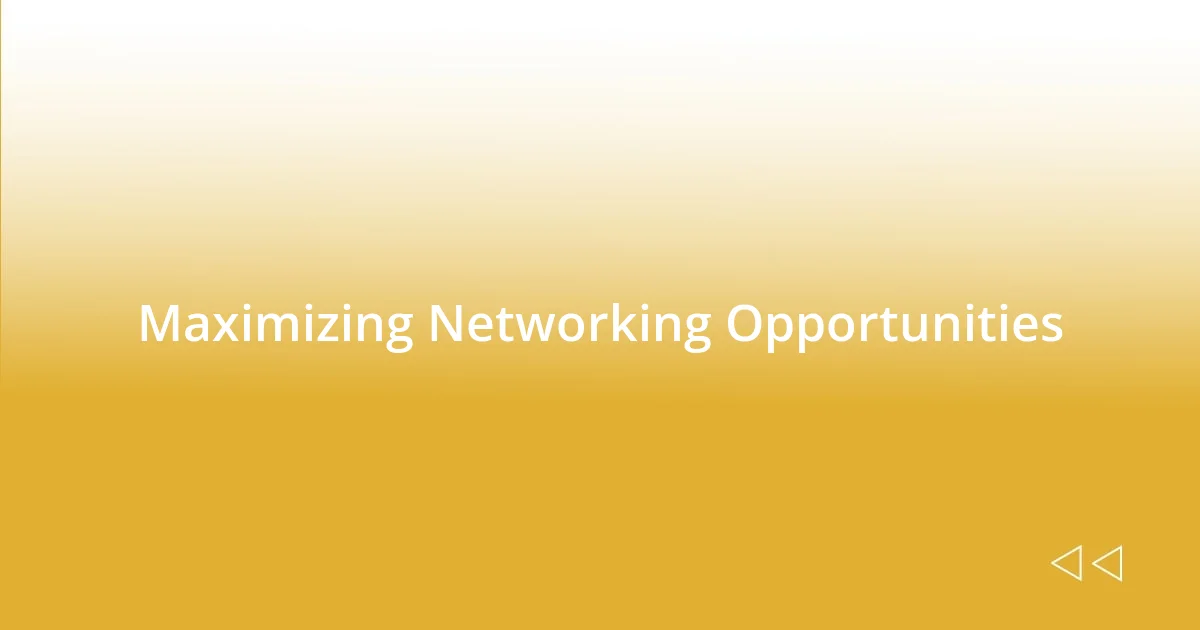
Maximizing Networking Opportunities
Networking during genealogy webinars can be a game-changer. I still remember joining a session where I reached out to someone who shared a similar research interest. We exchanged ideas and contacts, which not only expanded my network but also opened doors to valuable resources. Isn’t it fascinating how a simple connection can lead to an exciting collaborative research project?
After one webinar, I took the opportunity to join a follow-up discussion group. The level of engagement was inspiring! Members shared personal stories about their research, and I found myself taking notes on strategies I hadn’t considered before. Sometimes, it’s easy to overlook the importance of these informal gatherings, but they often foster deep connections and insights that lectures alone cannot provide.
Don’t forget to follow up after the event. I once sent a thank-you email to a speaker whose presentation resonated with me. She replied with a wealth of additional resources! Creating those touchpoints can turn fleeting moments into lasting connections. So, have you ever thought about how a simple message could lead to profound learning opportunities? You never know where it might take you.
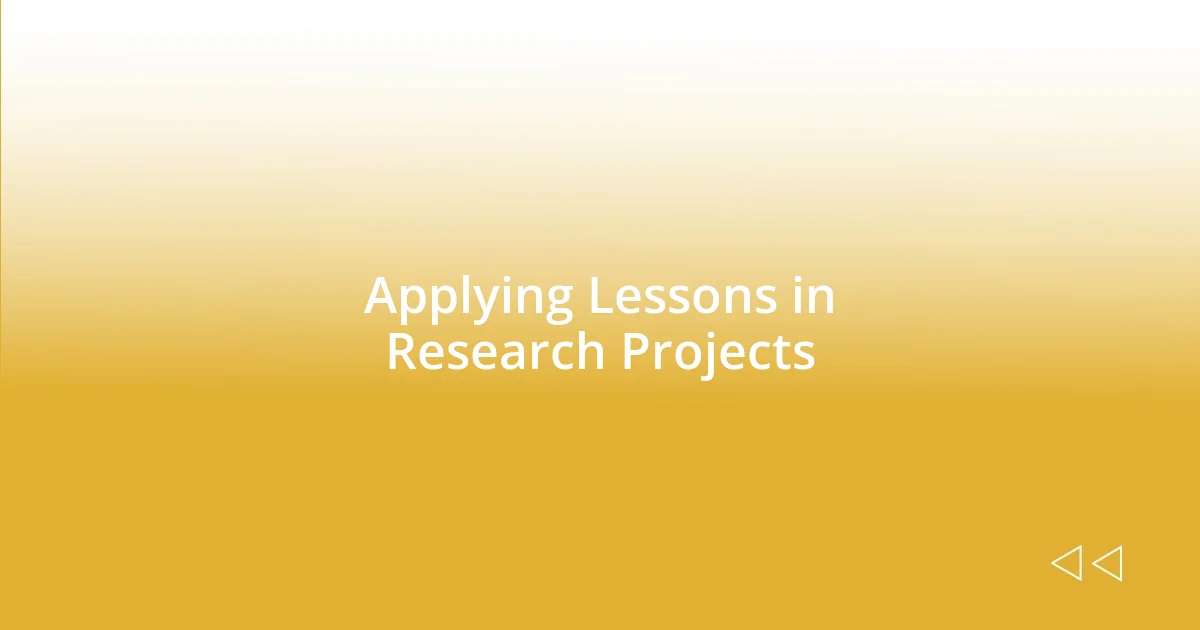
Applying Lessons in Research Projects
When I approach my research projects, I’ve found that the strategies I gained from webinars transform the way I tackle challenges. For instance, during a session focused on using census data effectively, I learned about the importance of cross-referencing information across different years. It hit me that my previous attempts had often relied too heavily on isolated records, missing the bigger picture. Now, I always make it a point to look at multiple entries over time; this method has led to clearer family narratives and surprising discoveries.
I particularly remember a session where an experienced genealogist shared their framework for organizing findings. Inspired by this, I revamped my own research filing system and began categorizing information thematically rather than just chronologically. It was a lightbulb moment! I noticed not only an increase in my efficiency but also a refreshing clarity in how I viewed connections within my research. Isn’t it amazing how a small adjustment in your approach can yield substantial results?
One lesson I continually apply is the emphasis on iteration. After attending a webinar that highlighted the importance of revisiting and refining research questions, I started to re-evaluate my goals regularly. For instance, I once aimed to trace an ancestor’s lineage in a straightforward way, only to realize that digging deeper into their social context changed everything. The process isn’t linear, and embracing that fluidity has made my projects not just more productive but a lot more enjoyable too. Have you ever stopped to reassess your goals mid-research? You might discover new layers to your family history waiting to be uncovered!
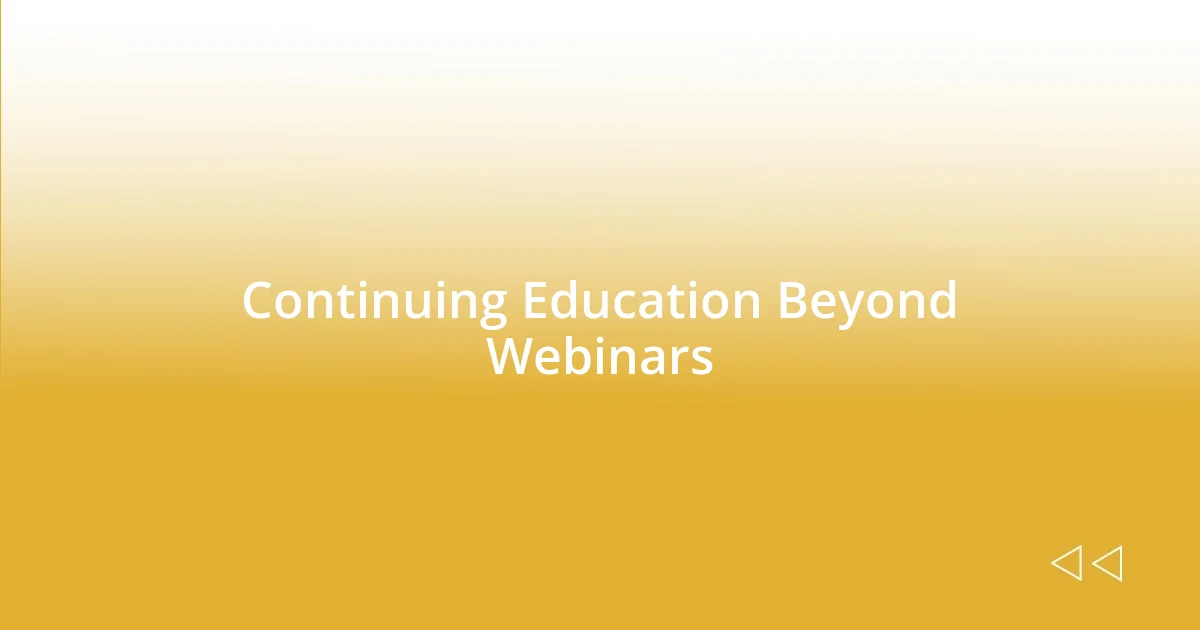
Continuing Education Beyond Webinars
Continuing education in genealogy doesn’t end with webinars; there are myriad avenues to explore. After attending a particularly enlightening session, I dove into local genealogy clubs. Joining one felt a bit daunting at first, but walking into that meeting was one of the best decisions I made. Engaging with fellow enthusiasts in person brought so much depth to the theories I learned online. Have you experienced that thrill of exchanging knowledge face-to-face? It’s a different vibe that really fuels passion for research.
Another approach I’ve found helpful is diving into books and journals focused on specific genealogy methodologies. One time, I picked up a book about immigrant ancestor research, and it completely reshaped my perspective. The author shared detailed case studies, which inspired me to look at my own family’s immigration story through a fresh lens. Reading deepens your understanding and often offers new ways to tackle familiar challenges. What have you read lately that sparked a new idea for you?
Courses, workshops, and even online resources can complement what I’ve gained from webinars. I remember signing up for a weekend course on genetic genealogy that turned out to be a turning point in my research. Learning how to interpret DNA results provided me with tools I hadn’t even considered before. It made me wonder: how often do we underestimate the impact of structured learning on our growth? If you haven’t branched out beyond webinars yet, I encourage you to explore these opportunities—there’s a whole world of knowledge waiting for you!
